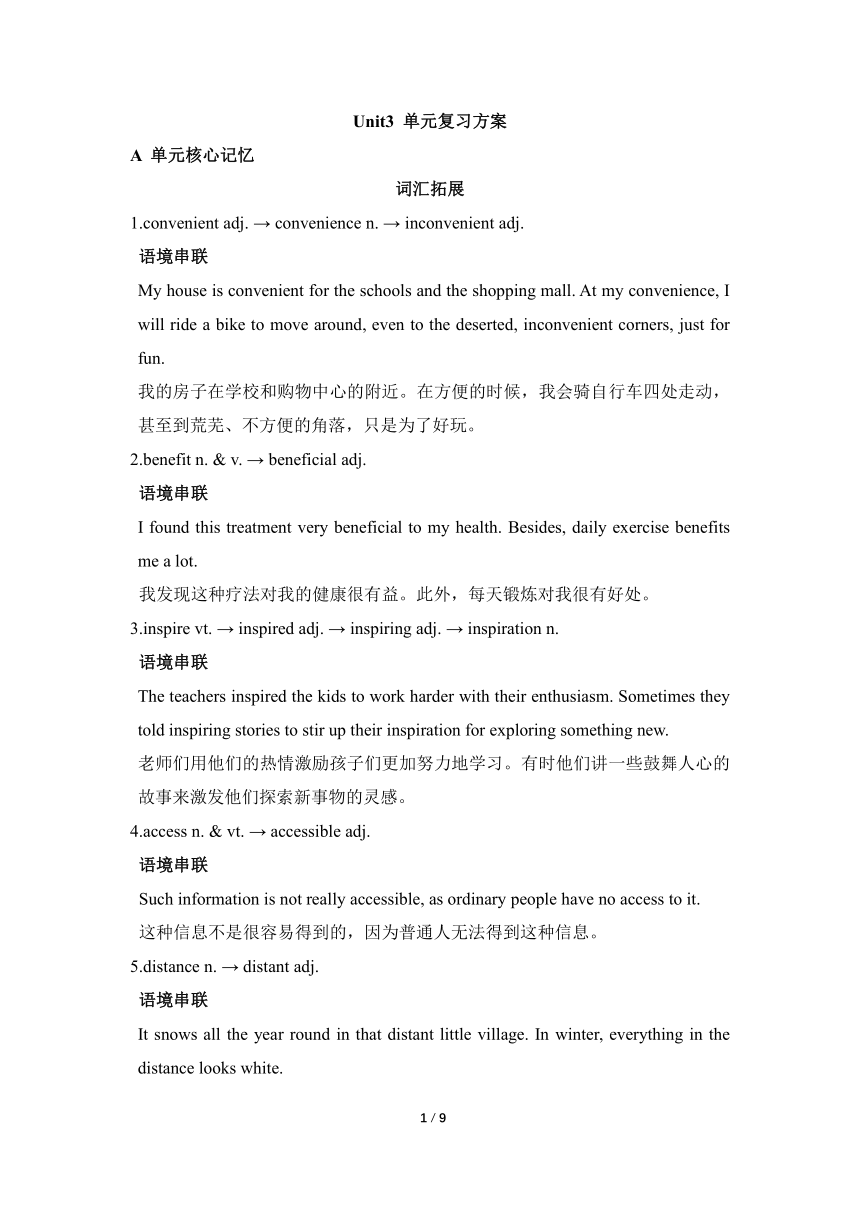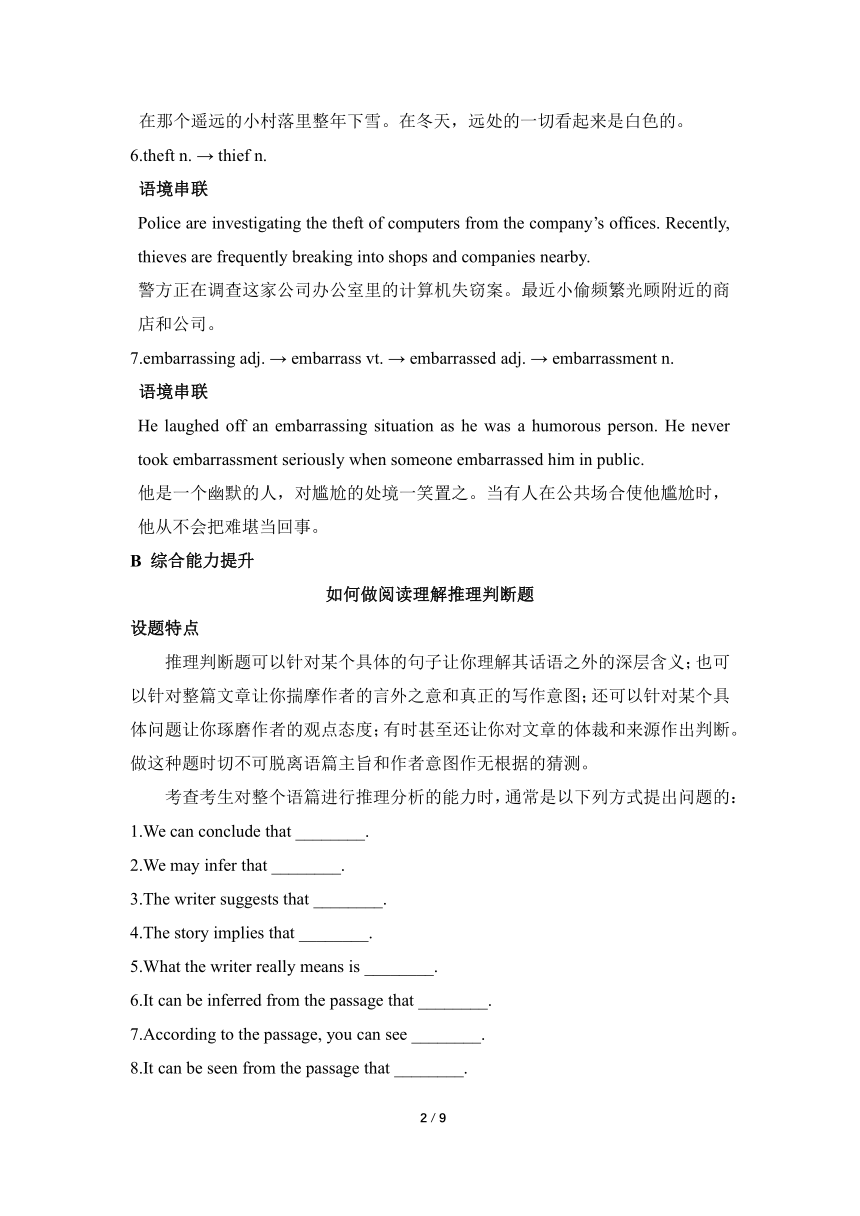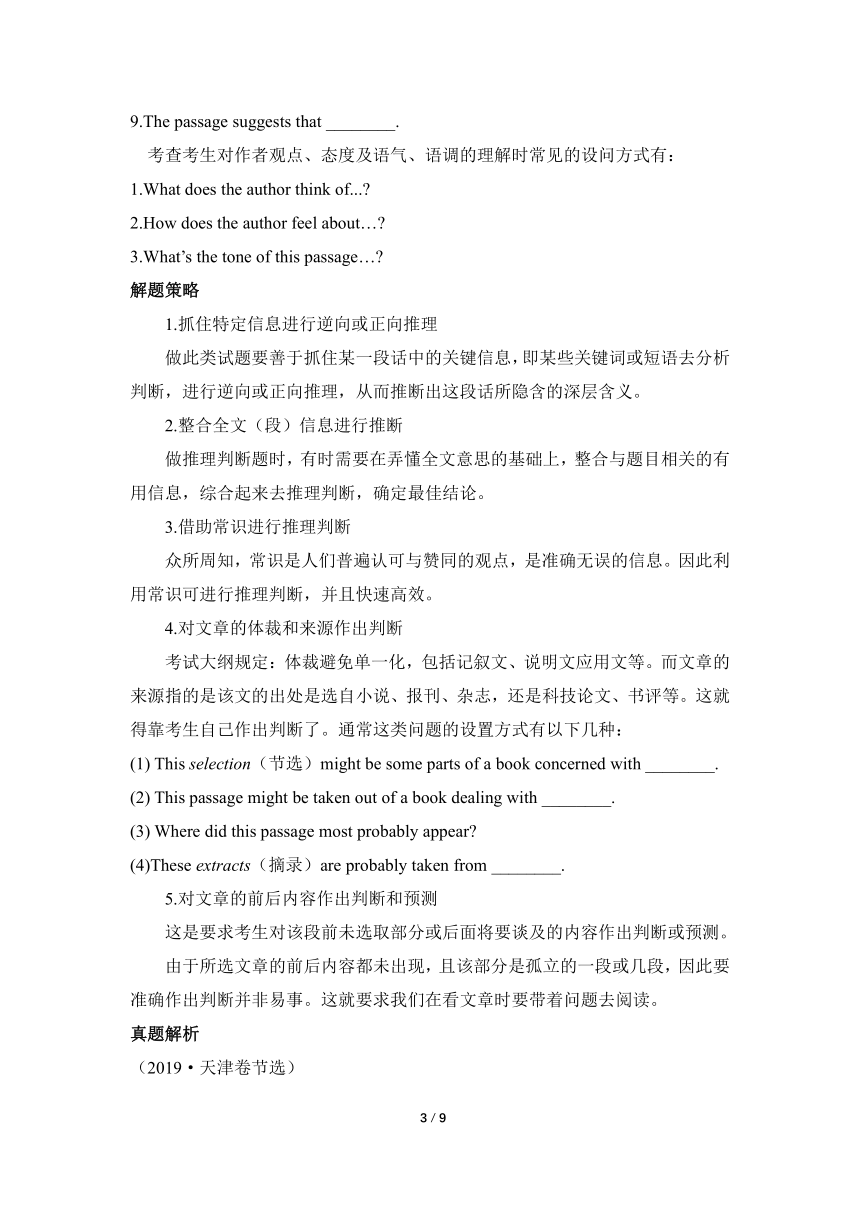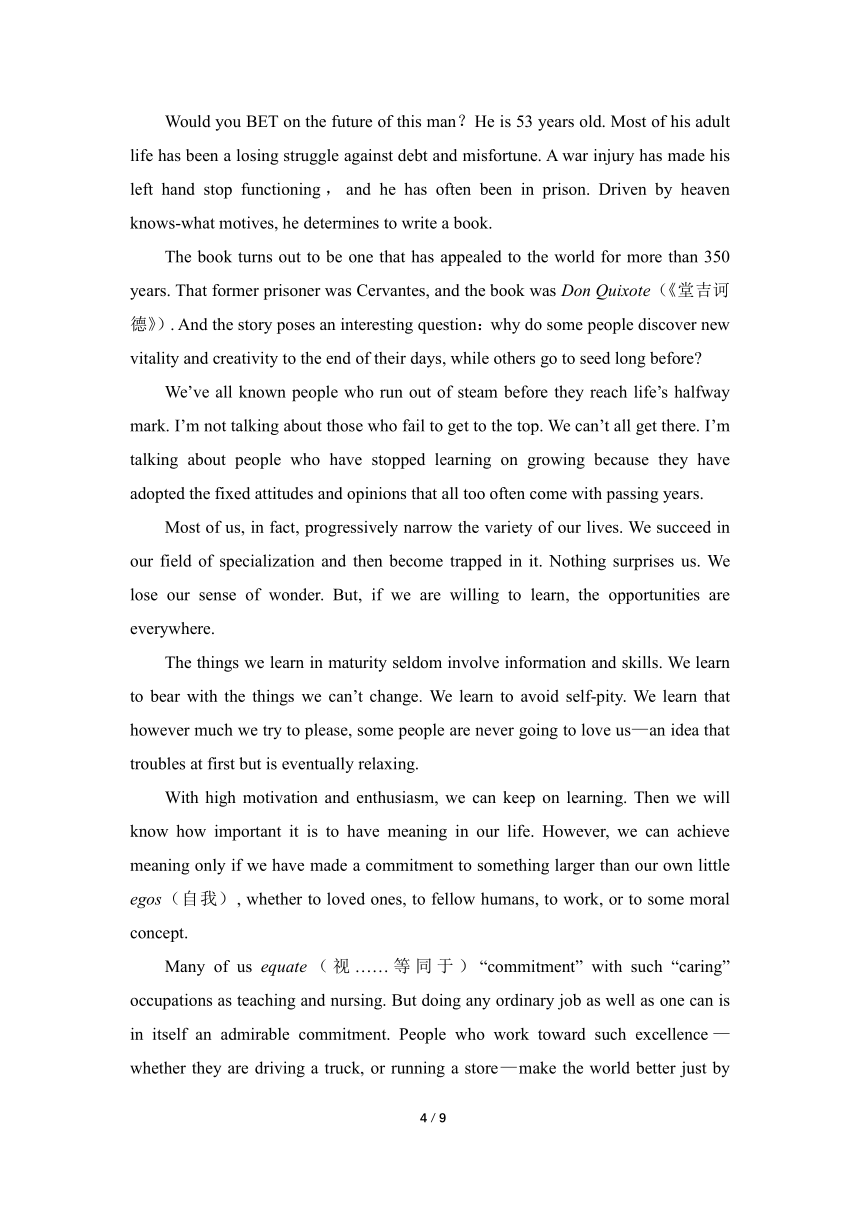人教版(2019)高中英语必修第二册 Unit3 The internet 单元复习方案(有答案)
文档属性
| 名称 | 人教版(2019)高中英语必修第二册 Unit3 The internet 单元复习方案(有答案) |

|
|
| 格式 | docx | ||
| 文件大小 | 22.5KB | ||
| 资源类型 | 教案 | ||
| 版本资源 | 人教版(2019) | ||
| 科目 | 英语 | ||
| 更新时间 | 2023-03-09 00:00:00 | ||
图片预览




文档简介
Unit3 单元复习方案
A 单元核心记忆
词汇拓展
1.convenient adj. → convenience n. → inconvenient adj.
语境串联
My house is convenient for the schools and the shopping mall. At my convenience, I will ride a bike to move around, even to the deserted, inconvenient corners, just for fun.
我的房子在学校和购物中心的附近。在方便的时候,我会骑自行车四处走动,甚至到荒芜、不方便的角落,只是为了好玩。
2.benefit n. & v. → beneficial adj.
语境串联
I found this treatment very beneficial to my health. Besides, daily exercise benefits me a lot.
我发现这种疗法对我的健康很有益。此外,每天锻炼对我很有好处。
3.inspire vt. → inspired adj. → inspiring adj. → inspiration n.
语境串联
The teachers inspired the kids to work harder with their enthusiasm. Sometimes they told inspiring stories to stir up their inspiration for exploring something new.
老师们用他们的热情激励孩子们更加努力地学习。有时他们讲一些鼓舞人心的故事来激发他们探索新事物的灵感。
4.access n. & vt. → accessible adj.
语境串联
Such information is not really accessible, as ordinary people have no access to it.
这种信息不是很容易得到的,因为普通人无法得到这种信息。
5.distance n. → distant adj.
语境串联
It snows all the year round in that distant little village. In winter, everything in the distance looks white.
在那个遥远的小村落里整年下雪。在冬天,远处的一切看起来是白色的。
6.theft n. → thief n.
语境串联
Police are investigating the theft of computers from the company’s offices. Recently, thieves are frequently breaking into shops and companies nearby.
警方正在调查这家公司办公室里的计算机失窃案。最近小偷频繁光顾附近的商店和公司。
7.embarrassing adj. → embarrass vt. → embarrassed adj. → embarrassment n.
语境串联
He laughed off an embarrassing situation as he was a humorous person. He never took embarrassment seriously when someone embarrassed him in public.
他是一个幽默的人,对尴尬的处境一笑置之。当有人在公共场合使他尴尬时,他从不会把难堪当回事。
B 综合能力提升
如何做阅读理解推理判断题
设题特点
推理判断题可以针对某个具体的句子让你理解其话语之外的深层含义;也可以针对整篇文章让你揣摩作者的言外之意和真正的写作意图;还可以针对某个具体问题让你琢磨作者的观点态度;有时甚至还让你对文章的体裁和来源作出判断。做这种题时切不可脱离语篇主旨和作者意图作无根据的猜测。
考查考生对整个语篇进行推理分析的能力时,通常是以下列方式提出问题的:
1.We can conclude that ________.
2.We may infer that ________.
3.The writer suggests that ________.
4.The story implies that ________.
5.What the writer really means is ________.
6.It can be inferred from the passage that ________.
7.According to the passage, you can see ________.
8.It can be seen from the passage that ________.
9.The passage suggests that ________.
考查考生对作者观点、态度及语气、语调的理解时常见的设问方式有:
1.What does the author think of...
2.How does the author feel about…
3.What’s the tone of this passage…
解题策略
1.抓住特定信息进行逆向或正向推理
做此类试题要善于抓住某一段话中的关键信息,即某些关键词或短语去分析判断,进行逆向或正向推理,从而推断出这段话所隐含的深层含义。
2.整合全文(段)信息进行推断
做推理判断题时,有时需要在弄懂全文意思的基础上,整合与题目相关的有用信息,综合起来去推理判断,确定最佳结论。
3.借助常识进行推理判断
众所周知,常识是人们普遍认可与赞同的观点,是准确无误的信息。因此利用常识可进行推理判断,并且快速高效。
4.对文章的体裁和来源作出判断
考试大纲规定:体裁避免单一化,包括记叙文、说明文应用文等。而文章的来源指的是该文的出处是选自小说、报刊、杂志,还是科技论文、书评等。这就得靠考生自己作出判断了。通常这类问题的设置方式有以下几种:
(1) This selection(节选)might be some parts of a book concerned with ________.
(2) This passage might be taken out of a book dealing with ________.
(3) Where did this passage most probably appear
(4)These extracts(摘录)are probably taken from ________.
5.对文章的前后内容作出判断和预测
这是要求考生对该段前未选取部分或后面将要谈及的内容作出判断或预测。
由于所选文章的前后内容都未出现,且该部分是孤立的一段或几段,因此要准确作出判断并非易事。这就要求我们在看文章时要带着问题去阅读。
真题解析
(2019·天津卷节选)
Would you BET on the future of this man?He is 53 years old. Most of his adult life has been a losing struggle against debt and misfortune. A war injury has made his left hand stop functioning,and he has often been in prison. Driven by heaven knows-what motives, he determines to write a book.
The book turns out to be one that has appealed to the world for more than 350 years. That former prisoner was Cervantes, and the book was Don Quixote(《堂吉诃德》). And the story poses an interesting question:why do some people discover new vitality and creativity to the end of their days, while others go to seed long before
We’ve all known people who run out of steam before they reach life’s halfway mark. I’m not talking about those who fail to get to the top. We can’t all get there. I’m talking about people who have stopped learning on growing because they have adopted the fixed attitudes and opinions that all too often come with passing years.
Most of us, in fact, progressively narrow the variety of our lives. We succeed in our field of specialization and then become trapped in it. Nothing surprises us. We lose our sense of wonder. But, if we are willing to learn, the opportunities are everywhere.
The things we learn in maturity seldom involve information and skills. We learn to bear with the things we can’t change. We learn to avoid self-pity. We learn that however much we try to please, some people are never going to love us—an idea that troubles at first but is eventually relaxing.
With high motivation and enthusiasm, we can keep on learning. Then we will know how important it is to have meaning in our life. However, we can achieve meaning only if we have made a commitment to something larger than our own little egos(自我), whether to loved ones, to fellow humans, to work, or to some moral concept.
Many of us equate(视……等同于)“commitment” with such “caring” occupations as teaching and nursing. But doing any ordinary job as well as one can is in itself an admirable commitment. People who work toward such excellence—whether they are driving a truck, or running a store—make the world better just by being the kind of people they are. They’ve learned life’s most valuable lesson.
1.The passage starts with the story of Cervantes to show that _______.
A. loss of freedom stimulates one’s creativity
B. age is not a barrier to achieving one’s goal
C. misery inspires a man to fight against his fate
D. disability cannot stop a man’s pursuit of success
2. What could be inferred from Paragraph 4
A. Those who dare to try often get themselves trapped.
B. Those who tend to think back can hardly go ahead.
C. Opportunity favors those with a curious mind.
D. Opportunity awaits those with a cautious mind
3. What does the author intend to tell us in Paragraph 5
A. A tough man can tolerate suffering.
B. A wise man can live without self-pity.
C. A man should try to satisfy people around him.
D. A man should learn suitable ways to deal with life.
语篇导读
本文是一篇议论文。文章主要讨论了如何过一种有意义的成年人生活。
答
1.B 推理判断题。根据第一段中的“Heis53 years old. Most of his adult life has been a losing struggle against debt and misfortune.”以及后文内容可知,所有的困境都没有阻挡他的成功,年龄也是如此,故选B。
2.C 推理判断题。根据第四段中的“We lose our sense of wonder. But, if we are willing to learn, the opportunities are everywhere.”可知,机会总是留给那些有好奇心的人,故选C。
3.D 推理判断题。根据第五段中的“We learn to bear with the things we can’t change We learn to avoid self-pity. we learn that however much we try to please, some people are never going to love us—an idea that troubles at first but is eventually relaxing.”可知,本段作者告诉我们要学会使用恰当的方式来对待生活,故选D。
C 写作方法指导
如何写博客
技巧点拨
随着博客成为现代生活中的一种时尚,从名人到平民百姓拥有一个自己的博客已经成为一种极为普遍流行的现象。博客文章大部分是议论文,是对某个问题或事件进行分析、评论,表明自己观点的一种文体。与一般议论文不同的是博客
点评当下社会现象。议论文有三个要素,即:论点、论据和论证。博客文章中必须体现议论文的特征。
写作步骤
第一段:引出博客的话题以及论点;
第二段:分析、论证论点,表明看法;
第三段:期待读者评论。
注意事项
1.写作时要注意论点正确,论证严密,语言精练。写博客议论文时,我们首先应准确找出论点、论据以及它们之间的关系,然后整理材料,组织成文。
2.采用多种方法进行论证。用正反、利弊或者对比等论述方法来支持论点。
常用表达
提出现象或争议话题
1.Today I thought I’d blog about a question that has been asked many times—how do you stay safe online and avoid bad experience on the Internet
2.Today I thought I’d blog about urban Waste Classification in Shanghai. Hot search topic: What kind of garbage are you
3.Today I thought I’d blog about the school bullying. What do you think about it and how can you avoid it
分析原因
1.This phenomenon exists for a number of reasons as follows. First, people want to become famous overnight, so they deliberately put forward some absurd opinions to stir up trouble in society. Second, some make false videos to increase click rate.
2.Bullying is such a large concern for parents of kids of all ages because this all-too-common problem is linked to depression, anxiety, and even suicide.
提出措施
1.Here are some steps to avoid…First, leave the website immediately and never click on anything. Second, learn to protect your privacy and never give out your identity and telephone number.
2.When it comes to...,people should think of…wisely. We can access the Internet within given time, learning English or doing some reading. Plus, being exposed to social media can broaden our horizons as well as obtain new knowledge.
3.Parents should regularly discuss Internet safety with their children.
典例导悟
假定你是李华,喜欢用英语写博客,将英语学习由课内延伸到了课外。今天,你写了一篇关于校园欺凌的博客。内容如下:
1.案例:一个女学生被一群女学生暴打的视频。
2.建议:惩罚;教育;预防。
注意:
1.词数100左右;
2.可以适当增加细节,以使行文连贯。
_________________________________________________________________________________________________________________________________________________________________________________________________________________________________________________________________________________________________________________________________________________________
思路导引
本篇书面表达是写博客,属于议论文体裁。博客围绕校园欺凌展开,分析其原因以及采取的措施,博客最后希望读者评论。写作时注意要点要齐全,表述要清晰,句子之间的衔接要自然。
佳作展示
Today I thought I’d blog about a phenomenon: school bullying. Through a video on the Internet, a poor girl student was bullied by a group of girl students.
There should be some measures to stop school bullying. First, laws should be made to punish such bullies to show the power of the law. Second, students should be educated to know he serious result of school bullying. Actually many bullies take bullying for granted. Last, preventing school bullying is necessary, so parents and school should pay more attention to students’ improper behavior before it becomes worse.
Have you experienced school bullying or do you have good advice to stop it Post your comments below.
迁移训练
假定你是李华,喜欢用英语写博客,点评时事。今天,你写了一篇博客,关于上海实施垃圾分类。内容如下:
1.上海人的焦虑:我的垃圾是什么。
2.建议:了解四种垃圾;全面坚持。
注意:
1.词数80左右;
2.可以适当增加细节,以使行文连贯。
参考词汇:垃圾分类 classifying rubbish
_________________________________________________________________________________________________________________________________________________________________________________________________________________________________________________________________________________________________________________________________________________________
范文赏读
Today I thought I’d blog about classifying rubbish in Shanghai. Shanghai citizens are confused about what kind of rubbish they have. Personally, classifying rubbish is beneficial to the environment and helps have energy. To avoid embarrassment, citizens should learn what four kinds of rubbish are: harmful rubbish, recyclable rubbish, wet rubbish and dry rubbish. If they insist on classifying rubbish, gradually they will get used to it. In fact, to our surprise, Shanghai citizens have set up a good example for the whole Chinese. What do you think of classifying rubbish in Shanghai Post your comments below.
8 / 8
A 单元核心记忆
词汇拓展
1.convenient adj. → convenience n. → inconvenient adj.
语境串联
My house is convenient for the schools and the shopping mall. At my convenience, I will ride a bike to move around, even to the deserted, inconvenient corners, just for fun.
我的房子在学校和购物中心的附近。在方便的时候,我会骑自行车四处走动,甚至到荒芜、不方便的角落,只是为了好玩。
2.benefit n. & v. → beneficial adj.
语境串联
I found this treatment very beneficial to my health. Besides, daily exercise benefits me a lot.
我发现这种疗法对我的健康很有益。此外,每天锻炼对我很有好处。
3.inspire vt. → inspired adj. → inspiring adj. → inspiration n.
语境串联
The teachers inspired the kids to work harder with their enthusiasm. Sometimes they told inspiring stories to stir up their inspiration for exploring something new.
老师们用他们的热情激励孩子们更加努力地学习。有时他们讲一些鼓舞人心的故事来激发他们探索新事物的灵感。
4.access n. & vt. → accessible adj.
语境串联
Such information is not really accessible, as ordinary people have no access to it.
这种信息不是很容易得到的,因为普通人无法得到这种信息。
5.distance n. → distant adj.
语境串联
It snows all the year round in that distant little village. In winter, everything in the distance looks white.
在那个遥远的小村落里整年下雪。在冬天,远处的一切看起来是白色的。
6.theft n. → thief n.
语境串联
Police are investigating the theft of computers from the company’s offices. Recently, thieves are frequently breaking into shops and companies nearby.
警方正在调查这家公司办公室里的计算机失窃案。最近小偷频繁光顾附近的商店和公司。
7.embarrassing adj. → embarrass vt. → embarrassed adj. → embarrassment n.
语境串联
He laughed off an embarrassing situation as he was a humorous person. He never took embarrassment seriously when someone embarrassed him in public.
他是一个幽默的人,对尴尬的处境一笑置之。当有人在公共场合使他尴尬时,他从不会把难堪当回事。
B 综合能力提升
如何做阅读理解推理判断题
设题特点
推理判断题可以针对某个具体的句子让你理解其话语之外的深层含义;也可以针对整篇文章让你揣摩作者的言外之意和真正的写作意图;还可以针对某个具体问题让你琢磨作者的观点态度;有时甚至还让你对文章的体裁和来源作出判断。做这种题时切不可脱离语篇主旨和作者意图作无根据的猜测。
考查考生对整个语篇进行推理分析的能力时,通常是以下列方式提出问题的:
1.We can conclude that ________.
2.We may infer that ________.
3.The writer suggests that ________.
4.The story implies that ________.
5.What the writer really means is ________.
6.It can be inferred from the passage that ________.
7.According to the passage, you can see ________.
8.It can be seen from the passage that ________.
9.The passage suggests that ________.
考查考生对作者观点、态度及语气、语调的理解时常见的设问方式有:
1.What does the author think of...
2.How does the author feel about…
3.What’s the tone of this passage…
解题策略
1.抓住特定信息进行逆向或正向推理
做此类试题要善于抓住某一段话中的关键信息,即某些关键词或短语去分析判断,进行逆向或正向推理,从而推断出这段话所隐含的深层含义。
2.整合全文(段)信息进行推断
做推理判断题时,有时需要在弄懂全文意思的基础上,整合与题目相关的有用信息,综合起来去推理判断,确定最佳结论。
3.借助常识进行推理判断
众所周知,常识是人们普遍认可与赞同的观点,是准确无误的信息。因此利用常识可进行推理判断,并且快速高效。
4.对文章的体裁和来源作出判断
考试大纲规定:体裁避免单一化,包括记叙文、说明文应用文等。而文章的来源指的是该文的出处是选自小说、报刊、杂志,还是科技论文、书评等。这就得靠考生自己作出判断了。通常这类问题的设置方式有以下几种:
(1) This selection(节选)might be some parts of a book concerned with ________.
(2) This passage might be taken out of a book dealing with ________.
(3) Where did this passage most probably appear
(4)These extracts(摘录)are probably taken from ________.
5.对文章的前后内容作出判断和预测
这是要求考生对该段前未选取部分或后面将要谈及的内容作出判断或预测。
由于所选文章的前后内容都未出现,且该部分是孤立的一段或几段,因此要准确作出判断并非易事。这就要求我们在看文章时要带着问题去阅读。
真题解析
(2019·天津卷节选)
Would you BET on the future of this man?He is 53 years old. Most of his adult life has been a losing struggle against debt and misfortune. A war injury has made his left hand stop functioning,and he has often been in prison. Driven by heaven knows-what motives, he determines to write a book.
The book turns out to be one that has appealed to the world for more than 350 years. That former prisoner was Cervantes, and the book was Don Quixote(《堂吉诃德》). And the story poses an interesting question:why do some people discover new vitality and creativity to the end of their days, while others go to seed long before
We’ve all known people who run out of steam before they reach life’s halfway mark. I’m not talking about those who fail to get to the top. We can’t all get there. I’m talking about people who have stopped learning on growing because they have adopted the fixed attitudes and opinions that all too often come with passing years.
Most of us, in fact, progressively narrow the variety of our lives. We succeed in our field of specialization and then become trapped in it. Nothing surprises us. We lose our sense of wonder. But, if we are willing to learn, the opportunities are everywhere.
The things we learn in maturity seldom involve information and skills. We learn to bear with the things we can’t change. We learn to avoid self-pity. We learn that however much we try to please, some people are never going to love us—an idea that troubles at first but is eventually relaxing.
With high motivation and enthusiasm, we can keep on learning. Then we will know how important it is to have meaning in our life. However, we can achieve meaning only if we have made a commitment to something larger than our own little egos(自我), whether to loved ones, to fellow humans, to work, or to some moral concept.
Many of us equate(视……等同于)“commitment” with such “caring” occupations as teaching and nursing. But doing any ordinary job as well as one can is in itself an admirable commitment. People who work toward such excellence—whether they are driving a truck, or running a store—make the world better just by being the kind of people they are. They’ve learned life’s most valuable lesson.
1.The passage starts with the story of Cervantes to show that _______.
A. loss of freedom stimulates one’s creativity
B. age is not a barrier to achieving one’s goal
C. misery inspires a man to fight against his fate
D. disability cannot stop a man’s pursuit of success
2. What could be inferred from Paragraph 4
A. Those who dare to try often get themselves trapped.
B. Those who tend to think back can hardly go ahead.
C. Opportunity favors those with a curious mind.
D. Opportunity awaits those with a cautious mind
3. What does the author intend to tell us in Paragraph 5
A. A tough man can tolerate suffering.
B. A wise man can live without self-pity.
C. A man should try to satisfy people around him.
D. A man should learn suitable ways to deal with life.
语篇导读
本文是一篇议论文。文章主要讨论了如何过一种有意义的成年人生活。
答
1.B 推理判断题。根据第一段中的“Heis53 years old. Most of his adult life has been a losing struggle against debt and misfortune.”以及后文内容可知,所有的困境都没有阻挡他的成功,年龄也是如此,故选B。
2.C 推理判断题。根据第四段中的“We lose our sense of wonder. But, if we are willing to learn, the opportunities are everywhere.”可知,机会总是留给那些有好奇心的人,故选C。
3.D 推理判断题。根据第五段中的“We learn to bear with the things we can’t change We learn to avoid self-pity. we learn that however much we try to please, some people are never going to love us—an idea that troubles at first but is eventually relaxing.”可知,本段作者告诉我们要学会使用恰当的方式来对待生活,故选D。
C 写作方法指导
如何写博客
技巧点拨
随着博客成为现代生活中的一种时尚,从名人到平民百姓拥有一个自己的博客已经成为一种极为普遍流行的现象。博客文章大部分是议论文,是对某个问题或事件进行分析、评论,表明自己观点的一种文体。与一般议论文不同的是博客
点评当下社会现象。议论文有三个要素,即:论点、论据和论证。博客文章中必须体现议论文的特征。
写作步骤
第一段:引出博客的话题以及论点;
第二段:分析、论证论点,表明看法;
第三段:期待读者评论。
注意事项
1.写作时要注意论点正确,论证严密,语言精练。写博客议论文时,我们首先应准确找出论点、论据以及它们之间的关系,然后整理材料,组织成文。
2.采用多种方法进行论证。用正反、利弊或者对比等论述方法来支持论点。
常用表达
提出现象或争议话题
1.Today I thought I’d blog about a question that has been asked many times—how do you stay safe online and avoid bad experience on the Internet
2.Today I thought I’d blog about urban Waste Classification in Shanghai. Hot search topic: What kind of garbage are you
3.Today I thought I’d blog about the school bullying. What do you think about it and how can you avoid it
分析原因
1.This phenomenon exists for a number of reasons as follows. First, people want to become famous overnight, so they deliberately put forward some absurd opinions to stir up trouble in society. Second, some make false videos to increase click rate.
2.Bullying is such a large concern for parents of kids of all ages because this all-too-common problem is linked to depression, anxiety, and even suicide.
提出措施
1.Here are some steps to avoid…First, leave the website immediately and never click on anything. Second, learn to protect your privacy and never give out your identity and telephone number.
2.When it comes to...,people should think of…wisely. We can access the Internet within given time, learning English or doing some reading. Plus, being exposed to social media can broaden our horizons as well as obtain new knowledge.
3.Parents should regularly discuss Internet safety with their children.
典例导悟
假定你是李华,喜欢用英语写博客,将英语学习由课内延伸到了课外。今天,你写了一篇关于校园欺凌的博客。内容如下:
1.案例:一个女学生被一群女学生暴打的视频。
2.建议:惩罚;教育;预防。
注意:
1.词数100左右;
2.可以适当增加细节,以使行文连贯。
_________________________________________________________________________________________________________________________________________________________________________________________________________________________________________________________________________________________________________________________________________________________
思路导引
本篇书面表达是写博客,属于议论文体裁。博客围绕校园欺凌展开,分析其原因以及采取的措施,博客最后希望读者评论。写作时注意要点要齐全,表述要清晰,句子之间的衔接要自然。
佳作展示
Today I thought I’d blog about a phenomenon: school bullying. Through a video on the Internet, a poor girl student was bullied by a group of girl students.
There should be some measures to stop school bullying. First, laws should be made to punish such bullies to show the power of the law. Second, students should be educated to know he serious result of school bullying. Actually many bullies take bullying for granted. Last, preventing school bullying is necessary, so parents and school should pay more attention to students’ improper behavior before it becomes worse.
Have you experienced school bullying or do you have good advice to stop it Post your comments below.
迁移训练
假定你是李华,喜欢用英语写博客,点评时事。今天,你写了一篇博客,关于上海实施垃圾分类。内容如下:
1.上海人的焦虑:我的垃圾是什么。
2.建议:了解四种垃圾;全面坚持。
注意:
1.词数80左右;
2.可以适当增加细节,以使行文连贯。
参考词汇:垃圾分类 classifying rubbish
_________________________________________________________________________________________________________________________________________________________________________________________________________________________________________________________________________________________________________________________________________________________
范文赏读
Today I thought I’d blog about classifying rubbish in Shanghai. Shanghai citizens are confused about what kind of rubbish they have. Personally, classifying rubbish is beneficial to the environment and helps have energy. To avoid embarrassment, citizens should learn what four kinds of rubbish are: harmful rubbish, recyclable rubbish, wet rubbish and dry rubbish. If they insist on classifying rubbish, gradually they will get used to it. In fact, to our surprise, Shanghai citizens have set up a good example for the whole Chinese. What do you think of classifying rubbish in Shanghai Post your comments below.
8 / 8
